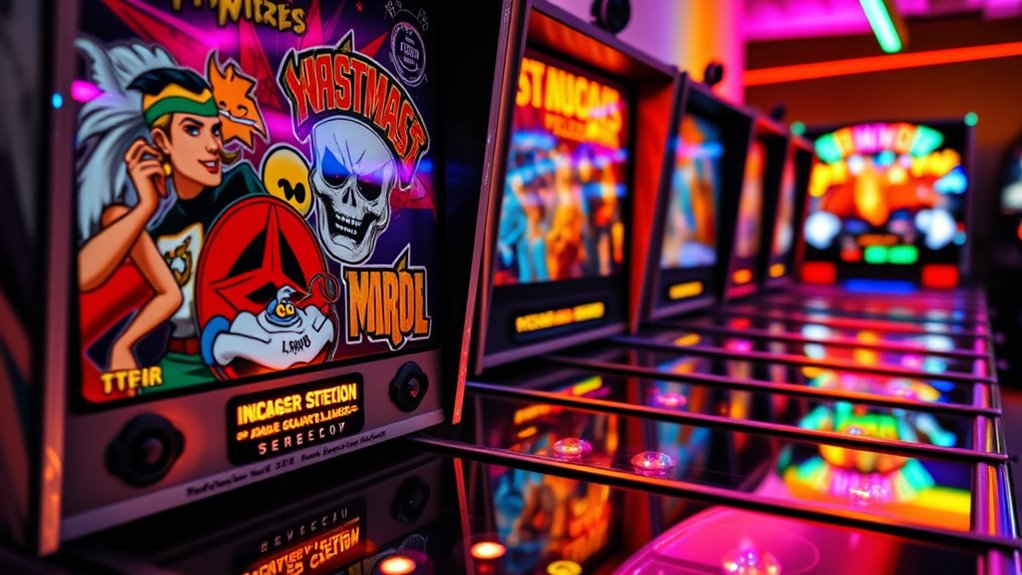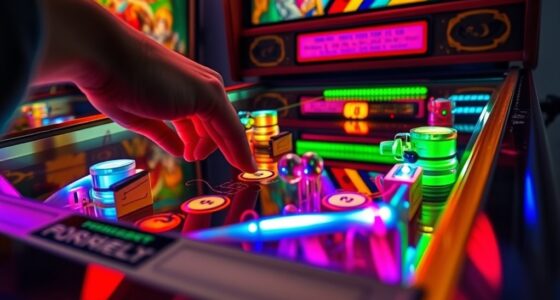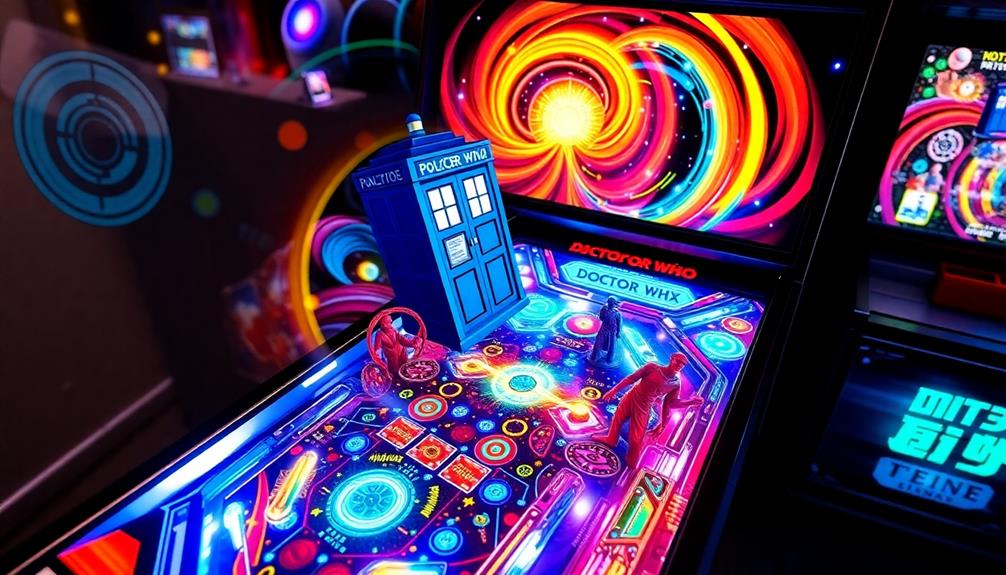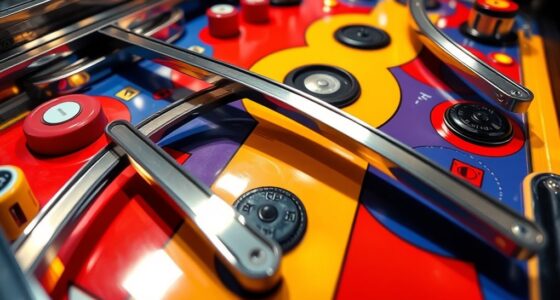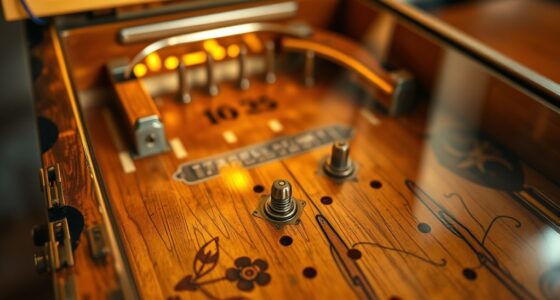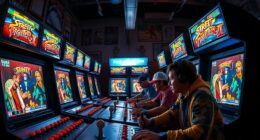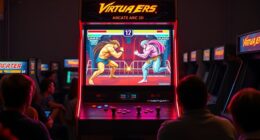The rise of licensed theme pinball machines reflects their growing popularity, as they blend familiar characters and stories from movies, TV shows, and comics to attract fans and collectors. By incorporating detailed artwork, sound effects, and interactive features, these machines create immersive experiences that stand out in a competitive market. Although licensing can be complex and costly, it ultimately boosts interest and adds emotional appeal. If you keep exploring, you’ll discover how this trend shapes the future of pinball.
Key Takeaways
- Licensed theme pinball machines have surged in popularity due to their appeal to fans of movies, TV shows, and comics.
- Licensing complexities and costs can delay production but add value through familiar characters and stories.
- Manufacturers boost market interest by creating visually detailed, immersive machines featuring popular franchises.
- Licensing enhances gameplay with themed artwork, sound effects, and interactive features reflecting source material.
- The trend drives innovation and revitalization in pinball, making machines more relevant and exciting for modern audiences.
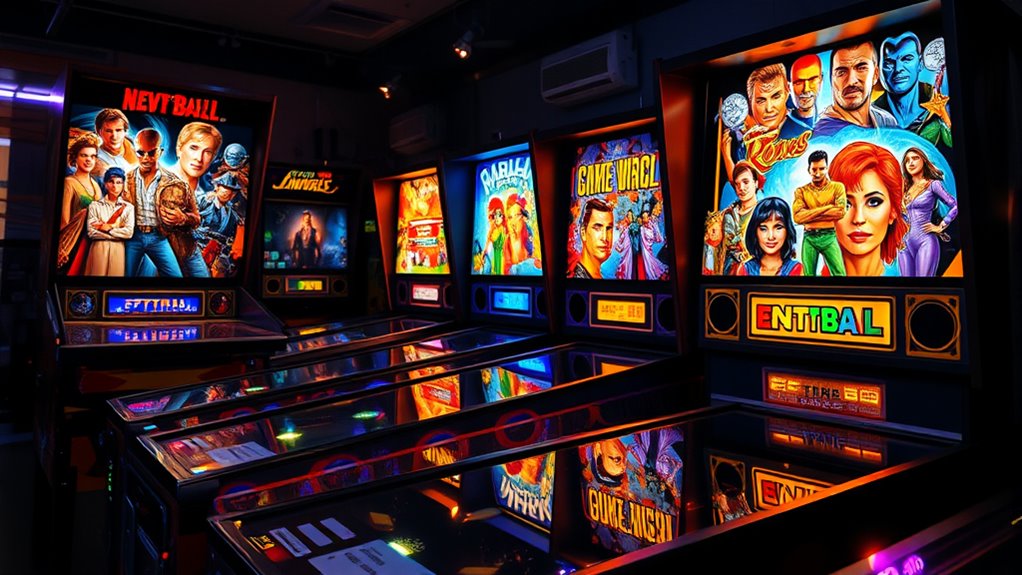
In recent years, licensed theme pinball machines have experienced a significant surge in popularity, transforming the landscape of the arcade gaming industry. You might notice that these machines now feature familiar characters, stories, and visuals from popular movies, TV shows, and comic franchises, making them instantly recognizable and appealing. This shift taps into your love for pop culture references, allowing you to connect with familiar characters and narratives while enjoying a classic game. However, behind the scenes, manufacturers often face licensing challenges that can complicate the process of bringing your favorite franchises to life on a pinball table.
Licensing challenges are a major hurdle because acquiring the rights to use a character, logo, or franchise can be complex and costly. Studios and rights holders want to ensure their intellectual property is represented accurately and positively, which often results in negotiations that can delay production or limit the scope of the licensing agreement. Sometimes, these negotiations involve strict stipulations about how the franchise can be portrayed, which can restrict the creative freedom of designers and manufacturers. As a result, you might see variations in how well the theme is integrated into the game, depending on the licensing terms negotiated.
Licensing issues can limit creativity and cause delays in themed pinball machine production.
Despite these challenges, the benefits of licensing are clear. Licensed machines tend to attract more players because they evoke nostalgia and familiarity, creating a stronger emotional connection. When you see your favorite superhero or iconic film scene on a pinball machine, it enhances your overall gaming experience. Manufacturers also capitalize on this by creating limited editions or collector’s items that appeal to fans and collectors alike, boosting the market’s interest and value. The popularity of these machines proves that licensing, while challenging, ultimately enhances the appeal of pinball by blending traditional gameplay with pop culture elements.
Furthermore, licensing enables game designers to craft more immersive and visually stunning machines. You’ll notice that licensed pinball tables often feature detailed artwork, themed sound effects, and interactive features that mirror the source material. This level of detail not only elevates the gameplay experience but also helps manufacturers stand out in a competitive market. While licensing may sometimes involve compromises, it’s clear that the integration of pop culture references has played a pivotal role in the resurgence of licensed theme pinball machines, making them more relevant and exciting for modern audiences like you. Additionally, advancements in licensing technology can streamline the process and reduce associated costs, further encouraging the creation of innovative themed machines.
Frequently Asked Questions
How Do Licensing Rights Impact Pinball Machine Production Costs?
Licensing rights influence your pinball machine production costs by adding royalty fees that you must pay to the rights holders. During licensing negotiations, you may face higher fees depending on the popularity of the theme or franchise. These costs can increase your overall budget, affecting your profit margins. You need to carefully balance licensing expenses with production costs to guarantee your machine remains profitable and competitive in the market.
What Are the Most Popular Licensed Themes in Pinball History?
You’ll find that popular licensed themes like *Star Wars*, *Batman*, and *The Addams Family* dominate pinball history, with *The Addams Family* selling over 20,000 units worldwide. These themes thrive on pop culture references, drawing players in with familiar stories. However, licensing controversies sometimes slow production or increase costs, highlighting how licensing rights heavily influence which themes make it onto machines and how successful they become.
How Do Licensed Machines Influence Collector Value?
Licensed machines often boost your collector market value because they tap into nostalgia appeal, making them highly desirable. When you own a pinball machine tied to a popular franchise, it attracts more buyers and can command higher prices. The nostalgia creates a strong emotional connection, increasing demand. As a result, licensed machines tend to appreciate more over time, making them a smart investment for collectors seeking both fun and value.
Are Licensed Pinball Machines More Durable Than Original Designs?
Think of licensed pinball machines as a well-built fortress; they often boast higher manufacturing quality thanks to strict brand reputation standards. You’ll find they tend to be more durable than original designs because licensed brands invest in better materials and craftsmanship. This focus on quality means your machine withstands the test of time, offering you long-lasting fun and reliability, much like a fortress that stands strong through storms.
What Companies Dominate the Licensed Pinball Market?
You’ll find that Stern Pinball and Jersey Jack Pinball dominate the licensed pinball market. These manufacturers form strategic partnerships with major entertainment companies, which helps them secure popular licenses. They navigate licensing fees effectively, making it possible to produce high-quality themed machines that attract collectors and players alike. Their strong industry presence and ability to manage licensing costs give them a competitive edge in delivering these sought-after licensed pinball machines.
Conclusion
You might be surprised to learn that licensed theme pinball machines now account for over 60% of new releases, reflecting their growing popularity among collectors and players alike. This trend shows how beloved franchises are fueling a resurgence in pinball enthusiasm, blending nostalgia with modern design. As these machines continue to dominate arcades and home game rooms, it’s clear that licensed themes are shaping the future of pinball entertainment, making the game more engaging and culturally relevant than ever before.
